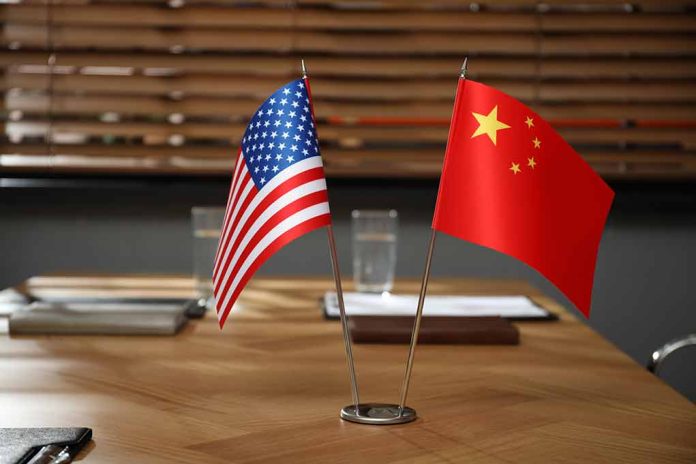
California Democrats warn of potential “death spiral” for U.S. tech firms as China export restrictions tighten.
At a Glance
- California lawmakers urge Biden administration to halt new tech export restrictions to China
- Concerns raised over potential “death spiral” for U.S. tech companies
- Lawmakers argue unilateral curbs benefit foreign rivals at the expense of U.S. businesses
- Call for justification that measures won’t harm U.S. competitiveness in advanced semiconductors
- Growing pushback among California Democrats against Biden’s semiconductor policy
California Democrats Sound Alarm on China Tech Restrictions
Democratic lawmakers from California are raising serious concerns about the Biden administration’s ongoing efforts to restrict technology exports to China. In a bold move, Senator Alex Padilla and Representative Zoe Lofgren have sent a letter to Alan Estevez of the U.S. Commerce Department, urging a pause on additional export controls. Their primary concern? The potential for these restrictions to severely damage American tech companies, particularly those based in Silicon Valley.
U.S. Democratic lawmakers from California urged Biden to halt its plans of imposing new restrictions on technology exports to China, arguing that further controls "could send longstanding U.S. companies into a death spiral." https://t.co/PutIYadL07 pic.twitter.com/HxT80dTlYH
— China Xinhua News (@XHNews) August 15, 2024
The lawmakers argue that unilateral curbs on tech exports could benefit foreign rivals while harming U.S. businesses. They’re seeking justification that these measures will not undermine American competitiveness in advanced semiconductors and manufacturing equipment. This pushback reflects a growing unease among California Democrats regarding the administration’s semiconductor policy.
California Democrats fear US tech firm 'death spiral' with more China curbs https://t.co/DywVokcyhE pic.twitter.com/eABclo8aiz
— Reuters (@Reuters) August 14, 2024
The Specter of a “Death Spiral”
Perhaps most alarming is the lawmakers’ warning of a potential “death spiral” for U.S. tech firms if further controls are implemented. This dire prediction underscores the critical importance of the tech industry to California’s economy and, by extension, the national economy. The state is home to leading chip making equipment companies like LAM, Applied Materials, and KLA, which could face significant challenges if export restrictions tighten further.
The concern isn’t limited to just a few companies. The potential ripple effects could disrupt supply chains, stifle innovation, and strain the broader U.S. economy. This “death spiral” scenario paints a picture of American tech firms losing global market share, reducing their capacity for research and development, and ultimately ceding technological leadership to foreign competitors.
A Global Perspective
Interestingly, the California lawmakers note that U.S. allies have not imposed similarly aggressive export restrictions on their companies. Countries like the Netherlands and Japan have implemented some controls on equipment exports to China, but these measures are not as strict as those imposed by the United States. This disparity raises questions about the effectiveness of unilateral action and the potential for it to disadvantage American companies in the global marketplace.
The debate over tech restrictions is part of a larger conversation about the U.S.-China technological decoupling. While there is bipartisan support for strengthening U.S. tech controls, especially for technologies critical to national security, finding the right balance is crucial. The challenge lies in protecting national security interests without undermining the competitiveness and innovation that have made American tech companies global leaders.
The Path Forward
As the Biden administration considers its next steps, the concerns raised by California Democrats highlight the need for a carefully calibrated approach. Balancing national security with economic interests is no simple task, but it’s clear that the stakes are high. The future of American technological leadership and the health of a vital sector of the U.S. economy hang in the balance.
The coming months will likely see continued debate and negotiations as policymakers seek to address these complex issues. For now, the tech industry and its supporters in Congress are making their voices heard, urging caution and a thorough examination of the potential consequences of further restrictions. The outcome of this debate could shape the future of U.S.-China relations and the global tech landscape for years to come.
Sources
- California Democrats fear US tech firm ‘death spiral’ with more China curbs
- California Democrats Fear US Tech Firm ‘Death Spiral’ With More China Curbs
- California Democrats fear more restrictions on China could lead to “death spiral” for U.S. tech firms
- U.S.-China Technological “Decoupling”: A Strategy and Policy Framework
- California Democrats fear more restrictions on China could lead to ‘death spiral’ for US tech firm














